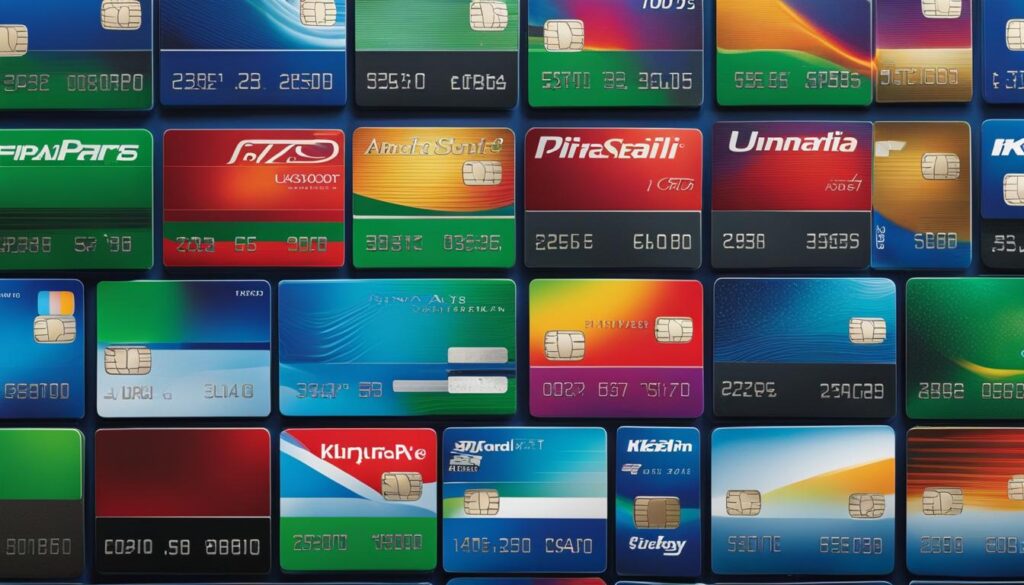In your 20s, it is crucial to establish good credit card management habits to set yourself up for a secure financial future. This article provides practical tips and advice on how to effectively manage your credit cards and avoid debt, ensuring a strong financial foundation for the years ahead.
Key Takeaways:
- Establishing good credit card management habits in your 20s is essential for a secure financial future.
- Understanding the importance of responsible credit card usage can help avoid debt and high interest rates.
- Choosing the right credit card for your needs is crucial in managing your finances effectively.
- Strategies to pay off credit card debt include prioritizing debts, taking advantage of lower interest rates, and creating a budget.
- Building and maintaining a good credit score opens up better financial opportunities.
The Importance of Responsible Credit Card Usage
Responsible credit card usage is crucial when it comes to managing your finances effectively in your 20s. It is essential to understand the potential dangers of credit card debt and the impact of high interest rates. By using credit cards responsibly, you can avoid accumulating debt and protect your financial stability for the long term.
When you carry a balance on your credit card, you are subject to interest charges that can quickly add up and become overwhelming. By paying off your credit card balance in full each month, you can avoid these interest charges and save yourself a significant amount of money in the long run. It is a good practice to only charge what you can afford to pay off promptly.
“Credit cards can be a great financial tool when used responsibly. It’s important to remember that the money you spend on your credit card is not free; it’s a loan that you have to pay back with interest,” says financial expert Jane Smith.
Additionally, it is important to keep your credit utilization ratio low. This ratio is the amount of credit you are using compared to your overall credit limit. By keeping your credit utilization ratio below 30%, you demonstrate responsible credit card usage and can improve your credit score over time.
| Benefits of Responsible Credit Card Usage |
|---|
| Builds a positive credit history |
| Improves credit score |
| Provides fraud protection |
| Enables easy online and in-person purchases |
By understanding the importance of responsible credit card usage and implementing strategies to manage your spending effectively, you can protect yourself from unnecessary debt and build a solid foundation for your financial future.
Choosing the Right Credit Card for Your Needs
When it comes to managing your credit cards in your 20s, selecting the right one that suits your needs is paramount. With a variety of credit card options available, understanding the features and benefits they offer can help you make an informed decision. Whether you are looking for rewards, cash back, or low interest rates, choosing the right credit card can have a significant impact on your financial journey.

Comparing Credit Card Options
There are several factors to consider when comparing credit card options. One of the key aspects to evaluate is the rewards program. Many credit cards offer rewards such as cash back, travel points, or discounts on specific purchases. Assessing your spending habits and lifestyle can help you determine which rewards program aligns best with your needs.
Additionally, you should consider the annual fee associated with the credit card. Some cards may have higher annual fees but offer more extensive benefits, while others may have lower or no annual fees but fewer perks. Analyzing your financial situation and the value you can derive from the card’s benefits will aid in making an appropriate choice.
The Benefits of Choosing Wisely
Choosing the right credit card for your needs can provide a range of benefits. By selecting a card that aligns with your spending patterns and financial goals, you can maximize the rewards and benefits it offers. Whether it’s earning cash back on everyday purchases or enjoying travel perks, a well-chosen credit card can enhance your overall financial experience.
Furthermore, a credit card that is tailored to your needs can help you establish a positive credit history. Consistently using the card responsibly, making timely payments, and keeping a low credit utilization ratio can contribute to building a strong credit score. This, in turn, may increase your chances of qualifying for other financial opportunities in the future, such as loans or mortgages.
| Credit Card Option | Rewards Program | Annual Fee |
|---|---|---|
| Card A | 2% cash back on all purchases | $0 |
| Card B | Travel points | $95 |
| Card C | 5% cash back on groceries and gas | $50 |
Table: Comparison of Different Credit Card Options
It’s important to carefully review the terms and conditions of each credit card and assess how they align with your financial goals. By evaluating the rewards program, annual fees, and other key features, you can confidently choose a credit card that provides the benefits you desire.
Strategies to Pay Off Credit Card Debt
If you find yourself with credit card debt in your 20s, it is crucial to have a clear strategy for paying it off. By implementing effective debt repayment strategies, you can regain control of your finances and work towards becoming debt-free.
1. Prioritize Debts
Start by organizing your debts and prioritizing them based on interest rates and balances. This will help you determine which debts to tackle first. Consider focusing on the debt with the highest interest rate or the one with the smallest balance, known as the snowball method. By paying off one debt at a time, you can build momentum and stay motivated.
2. Take Advantage of Lower Interest Rates
If possible, explore options to consolidate your credit card debt into a single loan or transfer balances to a card with a lower interest rate. This can help reduce the overall interest you pay and make it easier to manage your debt. However, be cautious of any balance transfer fees or potential hidden costs.
3. Create a Budget
Developing a budget is essential for managing your debt and ensuring you have enough funds to make payments. Take a close look at your income and expenses to determine how much you can allocate towards debt repayment each month. Cut back on unnecessary expenses and redirect those funds towards paying off your credit card debt.
Remember, it is important to continue making at least the minimum payments on all your credit cards while focusing on paying off the debt with the highest interest rate or the smallest balance.
By following these strategies and maintaining a disciplined approach to debt repayment, you can effectively manage and pay off your credit card debt. Remember that it may take time and effort, but with persistence, you can achieve financial freedom and set yourself up for a secure future.
Building and Maintaining a Good Credit Score
In order to secure your financial future, it is crucial to build and maintain a good credit score. Your credit score plays a significant role in determining your ability to access credit, such as loans and mortgages, as well as the interest rates you will be offered. Additionally, a good credit score can open up opportunities for better financial products and services. Let’s explore some key factors that contribute to a healthy credit score.
Establishing Credit History
To begin building your credit score, you must establish a credit history. This can be done by opening a credit card in your name or becoming an authorized user on someone else’s credit card. By using your credit card responsibly and making timely payments, you demonstrate to lenders that you are a reliable borrower. It’s important to note that responsible credit usage is key to establishing a positive credit history and maintaining a good credit score.
Managing Credit Utilization
Credit utilization refers to the amount of available credit you are using. It is recommended to keep your credit utilization ratio below 30% to maintain a good credit score. For example, if you have a credit limit of $10,000, you should aim to keep your outstanding balance below $3,000. Keeping your credit utilization low shows lenders that you are using credit responsibly and not relying heavily on borrowed funds.
| Credit Utilization Range | Impact on Credit Score |
|---|---|
| 0% – 10% | Positive impact; demonstrates responsible credit usage |
| 11% – 30% | Neutral impact; considered acceptable credit utilization |
| 31% – 50% | Negative impact; indicates higher credit risk |
| 51% – 100% | Significantly negative impact; high credit risk |
Regularly Monitoring Your Credit
It is important to regularly monitor your credit report for any errors or discrepancies that could negatively impact your credit score. By reviewing your credit report, you can identify and address any inaccuracies or suspicious activity. Additionally, monitoring your credit allows you to stay informed about your overall financial health and make informed decisions about credit utilization and managing your debt.
Building and maintaining a good credit score requires discipline, responsible credit usage, and proactive monitoring. By establishing a solid credit history, managing your credit utilization, and regularly monitoring your credit report, you can shape a strong credit foundation that will benefit you in the long run.
Setting Financial Goals and Saving for the Future
Setting financial goals and saving for the future are crucial steps to ensure financial security in your 20s. By establishing clear goals and implementing a saving strategy, you can lay the groundwork for a successful financial future.
One of the primary financial goals in your 20s is to start saving for retirement. While retirement may seem far off, it’s important to begin saving early to take advantage of compounding interest. Consider opening a retirement account, such as a 401(k) or an IRA, and contribute regularly to build a strong retirement fund over time.
Another essential aspect of financial goal-setting is creating an emergency fund. Life is unpredictable, and having a financial safety net in place can protect you from unexpected expenses or income loss. Aim to save at least three to six months’ worth of living expenses in a separate, easily accessible account. This fund will provide peace of mind and protect you from going into debt during challenging times.
To track your progress towards your financial goals, it can be helpful to create a budget. This will allow you to allocate your income effectively, prioritize savings, and monitor your spending habits. Use budgeting tools or apps to track your expenses, identify areas where you can cut back, and redirect those funds towards your savings goals.
Remember, setting financial goals and saving for the future is a long-term commitment. Stay focused, stay disciplined, and make adjustments to your plans as necessary. By laying the foundation for financial success in your 20s, you can set yourself up for a prosperous future.
Financial Goals in Your 20s:
- Start saving for retirement by contributing to a retirement account regularly.
- Create an emergency fund with three to six months’ worth of living expenses.
- Establish a budget to track your income, expenses, and savings progress.

Developing Good Money Habits
Developing good money habits in your 20s is crucial for long-term financial success. By practicing effective budgeting, cultivating responsible spending habits, and maintaining financial discipline, you can establish a solid financial foundation. Here are some practical tips to help you develop good money habits:
Saving and Budgeting
Creating a budget is essential for managing your finances effectively. Start by tracking your income and expenses to get a clear understanding of your financial situation. Allocate a portion of your income to savings, such as an emergency fund or retirement account. Prioritize your spending based on needs rather than wants and avoid unnecessary expenses. By saving consistently and budgeting wisely, you can achieve your financial goals and avoid unnecessary debt. Additionally, consider adjusting your budget as your financial situation changes, such as during retirement or after major life events. It’s also beneficial to seek out smart budgeting tips for seniors, which can help navigate unique financial challenges like healthcare costs and fixed incomes. By staying informed and adapting your strategy, you can maintain control over your finances and enjoy a more secure financial future.
Tracking and Reviewing Expenses
Regularly tracking and reviewing your expenses is an important habit to develop. Use apps or spreadsheets to categorize your spending, allowing you to identify areas where you can cut back and save. Review your expenses monthly to identify any patterns or areas where you may be overspending. This will help you make more informed financial decisions and stay on track with your budget.
Practicing Financial Discipline
Financial discipline is essential for staying on top of your finances. Avoid impulsive buying decisions and practice delayed gratification. Before making a purchase, ask yourself if it aligns with your long-term financial goals. Consider the opportunity cost of each purchase and whether it is worth sacrificing your financial stability. By practicing financial discipline, you can avoid unnecessary debt and build a strong financial future.
Developing good money habits in your 20s is a proactive step towards financial success. By budgeting effectively, tracking and reviewing expenses, and practicing financial discipline, you can set yourself up for a secure and prosperous future.

Conclusion
Managing credit cards wisely in your 20s is a crucial step towards achieving financial success. By following these credit card management tips, you can establish a solid foundation for your future. Remember to prioritize responsible credit card usage, build good money habits, and set achievable financial goals.
By using credit cards responsibly and paying off debts on time, you can avoid falling into a cycle of debt and maintain a healthy credit score. Additionally, choosing the right credit card that aligns with your needs and goals can help you maximize rewards and benefits while avoiding unnecessary fees.
In your 20s, it’s also important to start saving for the future. Setting financial goals, such as saving for retirement and creating an emergency fund, will provide you with financial security as you progress in your career and life. Building and maintaining a good credit score will open doors to better financial opportunities in the future.
So, take control of your financial future in your 20s by managing your credit cards wisely. By implementing these strategies and tips, you can pave the way for a secure and successful financial future.
FAQ
What are the key aspects of credit card management in your 20s?
The key aspects of credit card management in your 20s include responsible usage, choosing the right credit card, strategies to pay off debt, building and maintaining a good credit score, setting financial goals, and developing good money habits.
How does responsible credit card usage impact your financial future?
Responsible credit card usage helps you avoid accumulating debt and damaging your credit score. By using credit cards responsibly, you can establish good credit habits and set yourself up for a secure financial future.
How do I choose the right credit card for my needs?
When choosing a credit card, consider your financial goals and lifestyle. Look for credit cards that offer rewards and benefits that align with your needs. Understanding the features of different credit cards will help you select the most suitable one for your financial situation.
What strategies can I use to pay off credit card debt?
To pay off credit card debt, prioritize debts, take advantage of lower interest rates, and create a budget to manage your debt effectively. By implementing these strategies, you can regain control of your finances and work towards being debt-free.
Why is building and maintaining a good credit score important?
A good credit score is essential for long-term financial success. It impacts your ability to qualify for loans, credit cards, and favorable interest rates. By establishing good credit history and managing your credit utilization, you can improve your credit score and have access to better financial opportunities in the future.
What are some financial goals I should set in my 20s?
In your 20s, it is important to set financial goals such as saving for retirement and building an emergency fund. Establishing a solid savings plan early on will create a strong financial foundation and provide greater financial security as you progress in your career and life.
How can I develop good money habits?
To develop good money habits, practice budgeting, develop responsible spending habits, and exercise financial discipline. By adopting these habits in your 20s, you can establish a strong financial framework for a successful future.
What Role Does Insurance Play in Managing Credit Cards Wisely in Your 20s?
Managing credit cards wisely in your 20s is crucial, and insurance tips for your 20s can help mitigate potential financial risks. Insurance can protect you from unexpected events, such as theft or fraud, providing peace of mind. Additionally, some credit card companies offer insurance coverage for travel accidents or rental car damage. By understanding the role insurance plays in credit card usage, you can make informed decisions and safeguard your financial well-being.


Pingback: Building a Strong Credit Score in Your 20s: Essential Tips – Straight Fire Money